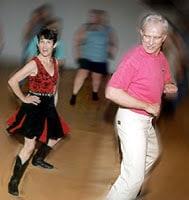Finding Love in Later Life
When Carol Denker interviewed me for her magnificent Autumn Romance, she started with this prelimary questionnaire. I came across it today and wanted to share it with you, as Valentine’s Day approaches:
CD: What advice would you give to individuals over 50 who are looking for love?
 JP: Participate in social activities that you love, and you’ll meet people with similar passions. In my case, I loved line dancing — in fact, I taught line dancing.
JP: Participate in social activities that you love, and you’ll meet people with similar passions. In my case, I loved line dancing — in fact, I taught line dancing. That was how I met Robert Rice, the love of my life, a man who happened to be looking for a new place to dance in December 2000.
CD: What have you learned about love from this relationship?
Pelvic Floor Relaxation: Advice from A Woman’s Touch
As I write Naked at Our Age, I’m awed by the level of candor from the real people who have agreed to share their stories and the generosity of the experts who are contributing solid, helpful tips that address the problems and concerns you’ve sent me.
The book will come out in Spring 2011, which I realize is a long wait for those of you who are experiencing challenges now that are preventing you from thoroughly enjoying your senior sexuality. Since my mission is to help you, I want to share something that I learned from Ellen Barnard, MSSW, because you might need this information –as I did — before the book comes out.
I wrote Ellen for personal advice — I was startled and dismayed to discover that I was unable to insert the Teneo Smartballs comfortably — something that would have been easy before my self-imposed, long period of celibacy following Robert’s death. “I’m aghast that I’ve let this happen to me,” I told her.
Here is an excerpt from her compassionate and helpful reply, which I hope will open your eyes, as it did mine:
Oh, please don’t be upset – there are many women of all ages who find them to be too wide to insert comfortably unless they are very aroused. Despite the information around them, they really are not intended to be used without arousal and a lot of lubrication first.
It’s not really about stretching the entrance to your vagina. The issue is how tight and how flexible the pelvic floor muscles are at the opening of your vagina. After menopause, it gets more difficult for the pelvic floor to relax unless you regularly practice doing so. Arousal helps with relaxation of the pelvic floor, thus allowing you to insert something inside your vagina comfortably, but after menopause it often takes a conscious relaxation effort in addition to significant massage for arousal.
So your task is to learn how to better relax those muscles and do so as you insert gradually wider toys. Don’t “push” against those muscles – that doesn’t work, and actually causes them to tighten further. Instead, either gently slip a finger alongside your favorite toy once you are fully aroused, taking a deep belly breath and once you feel the opening relax, slip the finger inside, or take a tapered toy and insert it deeper as you breath deeply and feel the vaginal opening relax.
It’s worth going to our site and downloading our revised Vaginal Renewal and Pelvic Floor Health booklets (see links under “Educational Brochures”) – we address the issue of a tight pelvic floor in both of them.
Ellen Barnard is a sex educator and counselor who believes we all deserve delightful, healthy sex lives for as long as we live. She consults on the topics of aging and sexuality, cancer and sexuality, and facilitating intimacy at the end of life. She is also the co-owner of A Woman’s Touch Sexuality Resource Center.
Visit A Woman’s Touch for “expertise in sexual health and pleasure.”
The Clitoris, Revealed
“It’s practically a little penis under that hood,” a 50-something-year-old writer who calls herself “jujuridl” describes the clitoris in “Female Anatomy 101,” an informative blog post on MiddlesexMD. Take a look at this diagram of the complete structure of the clitoris, showing what goes on under the hood, literally.
Those of us in touch with our clitoris — literally and figuratively — know that the sensation isn’t just in the little nub that’s visible (the glans) — the whole surrounding area is sensitive and sensational. That’s because the clitoris and its thousands of nerve endings extend far and wide beneath the surface.
The clitoris is the only part of the human body that has no function other than giving pleasure. Women who have lost sensitivity due to aging and hormonal changes might experiment with self-touch, partner-touch, and/or vibrator-touch using pressure all around the visible part of the clitoris, not just directly on the glans. As you see from the diagram, there’s quite an area to explore!
MiddlesexMD was created by for women over 40 by Dr. Barb DePree, M.D., a women’s health provider and a menopause care specialist. Many of us are significantly over 40 and way past menopause, but DePree’s information is plenty relevant to us — and to those who love us.
In fact, is there someone in your life who might understand better how to touch you by seeing this blog post?
Do you have a G-spot?
Actually, I’m not worried. As Dr. Petra Boynton says in her astute blog post today that’s as smart as it is entertaining — “Where have all the g spots gone?”:
It’s pretty simple. Women are diverse. Some of us really enjoy vaginal stimulation by finger, penis, sex toy (or other item). Some women prefer clitoral, anal, breast or other stimulation. Research that tells us we should focus exclusively on one spot or ignore it completely does little to reassure us or enhance our sex lives.
We’re all different, and other than the brain and clitoris being our #1 and #2 pleasure organs (in that order), we all experience sexual pleasure a bit differently, sometimes a lot differently. Maybe, Boynton suggests, the G-spot has become the subject of so much media attention because “as any journalist will tell you it’s much easier to get a g spot past your editor than mention the clitoris.”
In this study, “Genetic and environmental influences on self reported g spots in women: A twin study,” soon to be published in the Journal of Sexual Medicine,1875 women, aged 22-83 with a mean age of 55, answered questions about sex in a mailed questionnaire. Women were asked about their sexual practices and activity, and how frequently they experienced orgasm during intercourse and through masturbation.
The study used twins because, supposedly, if the G-spot is truly genetic, then both twins would report having one, which apparently did not happen. Does that mean they don’t, though? I didn’t get in touch (so to speak) with mine, if indeed I do have one, until a digitally dexterous lover pointed it out (again, so to speak) to me. Did these twins share lovers?
I was surprised to learn that only the answers of heterosexual women who engaged in vaginal intercourse were counted — why was that? 71 lesbian and bisexual women were excluded “because of the common use of digital stimulation among these women, which may bias the results.” Wait a minute. Can’t we learn the most about the elusive G-spot from women whose primary sexual expression is digital? I’m confused.
For me, the bottom line is this: Whether the G-spot exists or not, I hope you’re enjoying yours!
Don’t miss this spoof from the Daily Mash, MEN WHO CARE ABOUT THE G-SPOT ARE A MYTH, SAY EXPERTS.
Thank you, Dr. Petra Boynton — researcher, sex educator, and “agony aunt” — for your blog post that spurred mine.


